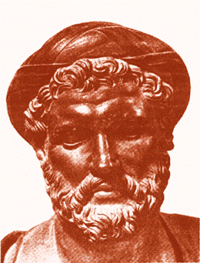
PYTHAGORAS
Physician, musicologist,
mathematician, founder of our
scientific age
he created the preconditions for
utilising harmonically structured
music in medicine
That is why the oldest works of art or religious and philosophical writings of mankind report of the effect of a kind of music which forms the soul, puts social life in order, and heals man holistically.
Even prior to the beginning of our modern calendar, in the sixth century BC, especially the famous physician, mathematician, philosopher, musicologist and musician respectively, Pythagoras, whom I have already mentioned several times, supported the application of a kind of music which was structured according to the laws of harmony of the microcosm of music, and was to have a beneficial effect on the life of the individual in health as well as in harmony with nature.
And the way in which this brilliant scholar approached this matter, finally made him the founder of our scientific era.
At the time of Pythagoras, music had the very conscious task of developing man ethically. All characteristics of this art were concentrated on the objective to naturally put the inner life of the individual human being in order, and to cultivate his soul to live with the creator and his creation in natural harmony – and in this way to also have a healthy inner self.
At that time, this practical task of music was simultaneously a religious, ideological, ethical and purely artistic one.
Pythagoras now aroused in this ethically shaped musical work the idea of modern scientific thinking by starting to objectivise the musical parameters which had so far only been defined religiously, philosophically or artistically – with measurements and numbers. He began to measure music and / or elements of music in terms of mathematics and physics.
For the religious, philosophical, ethical and artistic leaders of that time, this was an enormously revolutionary act which threatened to turn their previous conception of the world upside down – and so it was not a coincidence that Pythagoras got caught in an increasing whirlpool of religious, political, philosophical and artistic dispute and finally even in ideological persecution – for which, with the help of musicological research and the help of physics and mathematics, he prepared to capture the mentioned areas of life: religion, ethics, philosophy and art in an exact knowledge of scientific character, and to thereby demystify them – which, of course, was also linked to a loss of the previous power that the contemporary leaders of social life had.
Pythagoras had verified the natural point of contact of creation between the subjective and objective world in the microcosm of music: between our inner world with our religious, ethical, moral, philosophical and ideological ideas, but also with our talent, with our innate inner traits and abilities on one hand – and the rational world of mathematics, physics, chemistry and biology as well as astronomy on the other hand.
And he wanted to use this microcosm of music to firmly weld together the outer and inner world of man as well as the sciences naturally resulting from this.
And in his famous school for the training of young physicians, scientists and artists he therefore logically taught on one hand:
- the intuitive spontaneous inner realisation of the natural laws of harmony of the creator in the microcosm of music of the inner mental imaginative space, meaning in the area of musical intuition or musical creative thinking and feeling, as well as on the other hand
- the outer empirical: the scientific realisation of the natural laws of harmony of the microcosm of music with the help of his famous “Monochord”, the mathematical and physical investigation of the microcosm of music and its harmonical connection to other scientific fields of knowledge such as medicine, biology, physics and astronomy
so he combined the arts' intuitive and the scientific objective verifying achievement of realisation with each other, in order to advance to a holistic, standardised view of the inner and outer world, shaped by natural harmony.
On this integrated basis, he wanted to ensure the holistic systematical development of natural human dignity and the protection of life as well as the ecology.
Excerpt from:
Peter Hübner
Nature’s Laws of Harmony in the Microcosm of Music
From a lecture given by the classical composer at the medical faculty of the University of Heidelberg, the University of Tel Aviv and the University of Magdeburg, and the talks which followed on the application of the natural laws of harmony in the microcosm of music for medicine.